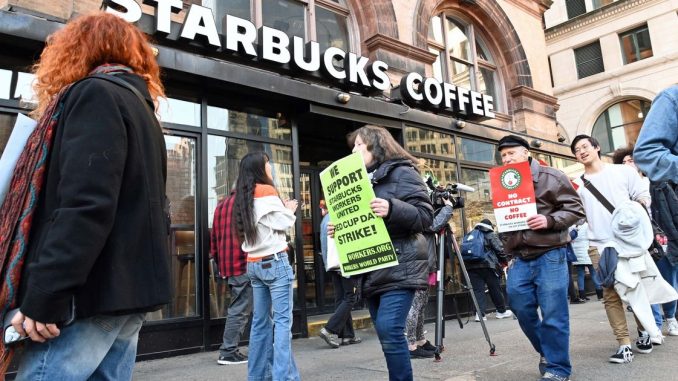
Dillon Dix was excited to compete this year in Starbucks’ North America Barista Championship, a company-wide contest in which the winner would receive a paid trip to Starbucks’ coffee farm in Costa Rica. But he found some disappointing news in the fine print about the contest: Unionized Starbucks stores are not eligible to participate.
Dix called the move “really petty.”
“It’s quite shocking and hard to comprehend the reasoning behind it, other than purely in a union-busting sense,” the 25-year-old said.
Union baristas say their exclusion is another punishment for having organized roughly 400 of the chain’s 9,000 corporate-owned U.S. stores since 2021. Starbucks has publicly committed to reaching contracts with the union, Workers United, but in recent weeks the union has filed 47 new charges alleging unfair labor practices, including one related to the barista championship.
According to internal documents viewed by HuffPost, Starbucks says union stores can’t participate in the competition because it’s a workplace benefit that must be bargained over if workers unionize. The company has made the same legal argument in withholding other perks from newly organized shops, including participation in Starbucks’ “black apron” program, which trains baristas to become elite “coffee masters.”
A Starbucks spokesperson said the barista competition includes paid time and travel for participants, and therefore the company believes it can’t grant the benefit to union workers without bargaining.
“We are working to further our mission, promises and values while investing in the partner experience around the world,” the spokesperson said. “We will continue to listen to the evolving needs of all partners and will continue working to better support them in their jobs, on their teams and in their lives.”
“It’s just a fun part of the job that I enjoy. They’re just trying to make my job less fun.”
– Dillon Dix on being excluded from the barista championship
Workers United says it has waived its right to bargain over such benefits and asked that they be extended to union members, arguing that Starbucks is breaking the law by not doing so. A judge at the National Labor Relations Board, which referees private-sector labor disputes, agreed with the union in a September ruling, finding that Starbucks was intentionally discriminating against union workers by holding back raises and benefits.
In new filings at the labor board, the union also claims Starbucks recently gave unionized workers smaller raises than nonunion workers; withheld new benefits offered to other employees, like faster vacation accrual and scheduling improvements; and fired five union supporters since Dec. 8, the day the company told the union it wanted to forge a more productive relationship.
Lydia Fernandez, a union leader and recently fired barista from Philadelphia, said she doesn’t believe the company has changed course in recent weeks.
“I see very much the same behavior,” said Fernandez, 25.
SAUL LOEB via Getty Images
Starbucks says it fired Fernandez for repeated time and attendance issues. But the union says the company began more strict enforcement because of her union activism. Workers United has filed an unfair labor practice charge over Fernandez’s termination, seeking to have her reinstated.
Officials at the NLRB must investigate the union’s new allegations before determining whether they have merit.
NLRB offices have filed more than 125 complaints against Starbucks covering over 400 alleged unfair labor practices, according to a board spokesperson. Agency judges have ruled that the company broke the law in more than 40 cases so far, while others are in earlier stages of litigation.
The charges that have been upheld include illegally firing union supporters, interrogating and surveilling employees, making unlawful threats and refusing to bargain with the union. Sharon Block, a labor law expert at Harvard Law School, told HuffPost in November that the breadth of rulings against Starbucks appeared unprecedented.
Dix said cutting union stores out of the barista championship may not seem as serious as other charges, but it still came as a “gut punch” to those who enjoy the competition. One barista selected from each store gets to take part.
“The charges upheld against Starbucks include illegally firing union supporters, interrogating and surveilling employees and making unlawful threats.”
Dix had competed in previous years, advancing in 2021 to the district level, where he faced off with other baristas from the Richmond, Virginia, area, he said. Contestants are judged on their drink-making abilities and their knowledge of coffee, something Dix, a six-year Starbucks veteran, takes pride in. He also holds a black apron he earned through the coffee masters program.
“It’s just a fun part of the job that I enjoy,” Dix said of the championship. “They’re just trying to make my job less fun.”
Starbucks says it has held barista championships around the world for the past 10 years, and that this is the first time the company is holding a joint competition for the U.S. and Canada. The company calls the contest “a celebration of our partners.” The winner this year heads to Hacienda Alsacia, the company’s Costa Rican farm that sits at the foot of a volcano.
Fernandez said it’s been frustrating to see benefits extended to nonunion stores and held back from the ones that organized.
“It’s like they are constantly taking actions that are petty and harmful to, I guess, make a point,” she said. “To me, that’s not taking a step toward bargaining in good faith.”


Be the first to comment